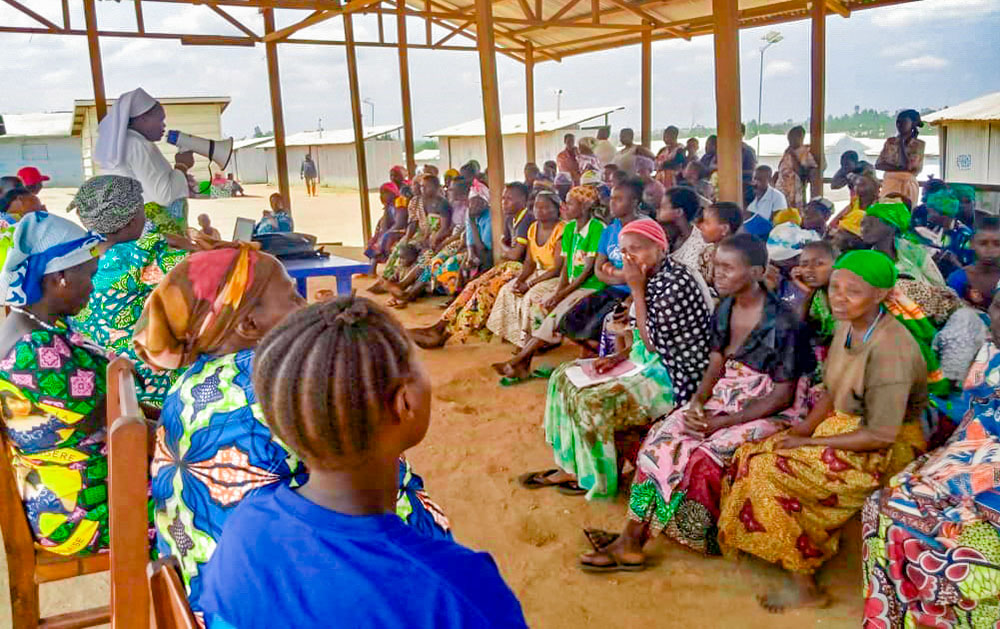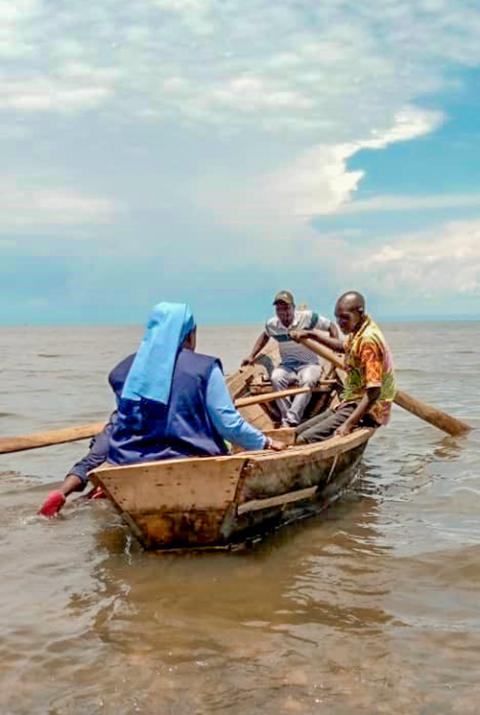
Servant of Jesus Sr. Angèle Gapio addresses refugees on the border of Uganda and the Democratic Republic of Congo. (Courtesy of Dieu Donne, Pax Christi International)
In a broken world like ours today, there is need to relentlessly find life-giving solutions to life-threatening problems. Empathy is in high demand when people seem to become more egoistic and overwhelmed with upcoming and ongoing problems. There is a yearning for peace and nonviolent voices to challenge and quench the fire of warmongers, networks of organized crime, perpetrators of international trafficking in persons, and labor exploiters.
Nonviolent communication, a tool with the goal of creating empathy in a conversation, is widely being used. It is based on the principle that once people listen to one another, it will be much easier to talk about a solution that satisfies all parties' fundamental needs.
It also targets interpersonal harmony and knowledge for future cooperation. This is what Marshall Rosenberg developed in the 1960s for racial integration and what is most needed today.
Last year, I wrote about Sacred Heart Sr. Mary Atimango in Juba, South Sudan, and what she has done to touch and win the hearts of some violent gang members there. Now we have Sr. Angèle Gapio of the Congregation of Servants of Jesus in the Democratic Republic Congo. She is one of the life-giving persons in hopeless and lifeless situations. She has a voice that creates huge impacts in the war-ravaged region of Ituri, in the Bunia Diocese in eastern Congo.
Her zeal for liberating the oppressed was ignited by Pax Christi International after participating in a workshop on nonviolent communication organized for the religious sisters in Goma, Congo. According to the sisters, after this program they were never the same again. They went on propagating the new teaching through sharing new values among the religious and local communities, and even proclaimed it to the rebels!
After the religious sisters gained some expertise from the training on nonviolent communication, they found some solutions to their ministry in the war zone. The topics included active nonviolence, peace-building, peaceful conflict transformation, trauma healing, reconciliation, and transformational leadership. The trainings soon spread to other dioceses and parts of the country.
Sister Angèle has committed herself to providing training for other sisters of different congregations working in the Bunia Diocese. She also gives training to young people in parishes, schools and for internally displaced persons, victims of violence by armed groups in Congo.
"This is the right time. We need more voices to talk about peace," Sister Angèle remarked.
"The junior sisters are very happy with the 'new' information and testify about a great personal transformation as a result of the workshop input," she said. "Our members and partners in the region look forward to further growth and learning opportunities in the coming months, including training for young people on the same topics."
Sister Angèle added, "The training was really striking for me, and it has changed my way of life in the community. This is nonviolence in action!"
Advertisement
With a university degree (licentiate) in development studies, Sister Angèle is the Caritas coordinator of the Bunia Diocese. She also teaches at the Institute of Religious Studies in Bunia.
With an exceptional charisma, Sister Angèle ventures into extremely dangerous outreaches. She has conquered her fear of being kidnapped or raped and goes into the bush through impassable tracks and ravines, where there are high risks of crossing ways with rebels.
She does it with the intention of looking for displaced survivors, destitutes, hidden and traumatized persons (some of whose family members have been massacred and houses burned down), and families who have been dislodged by the rebels. She goes to serve them with some water and food.
Sister Angèle has become a nonviolent, peace-loving person who thinks more of others. In this traumatic situation, she dares to go further into the bushes of deep forests to negotiate peace with the rebel groups.

Sr. Angèle Gapio crosses a river in a canoe to meet the rebels to seek possibilities of peaceful negotiations within Congo. (Courtesy of Dieu Donne, Pax Christi International)
Sister Angèle sometimes takes the risk of going after the rebels who have burned down the villages by taking by pirogue (a canoe) across the river to meet the rebels in the forest. For instance, when rebels besieged the town of Bunagana, which is on the border with Uganda, Sister Angèle could be seen in the battlefield at Korombo and crossing the border to take a message of solidarity and support to the families of Congolese refugees in Uganda.
Another observer commented, "We see Sister Angèle sitting in the forest, 60 kilometers away, bringing a message of nonviolence and peace, negotiating with the rebels who massacred the families and killed 65 people and burned down the village of Njugu in the parish of Drodro."
Because of her religious vocation, Sr. Angèle Gapio courageously faces her perils. She is among the many faith-filled religious women and men who are committed to the path of active nonviolence, peace-building and serving the needy society. The hope of relieving the vulnerable persons, especially the widows and orphans, and of building a peaceful society keep her busy day and night.
The province of Ituri has grappled with insecurity for more than 20 years, with terrible scenes of violence caused by the armed rebel groups, notably: M23 and the Allied Democratic Forces, an Islamist rebel group found in Uganda and the Democratic Republic of the Congo. The local people are at the mercy of these armed forces who kill people almost on a weekly basis.
The intervention of religious sisters at different levels in Africa cannot be underestimated. Fear and threats cause many to withdraw from the confrontation of evil. Like Veronica who braved the tyrants and dared to wipe the bloody face of Jesus on the way to Calvary, sisters are daring. They risk facing the human traffickers in persons, facing and seeking negotiations with rebels, and challenging organized criminals in various regions.
This calls for a greater collaboration to complement their efforts. We are grateful to the many organizations that support the work of sisters as they teach nonviolence, peace-building and reconciliation.








